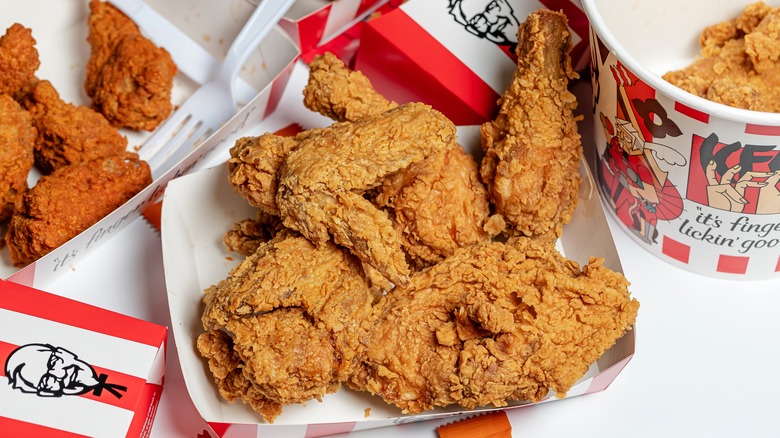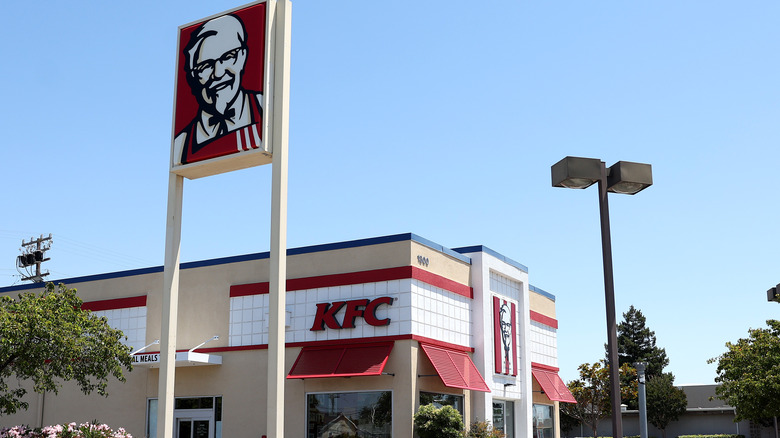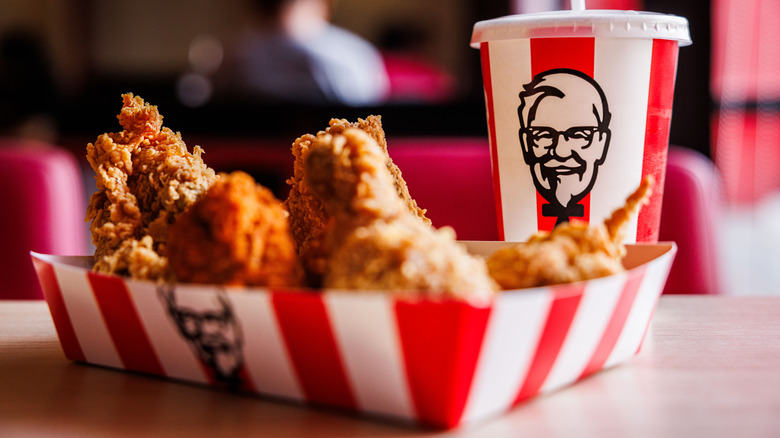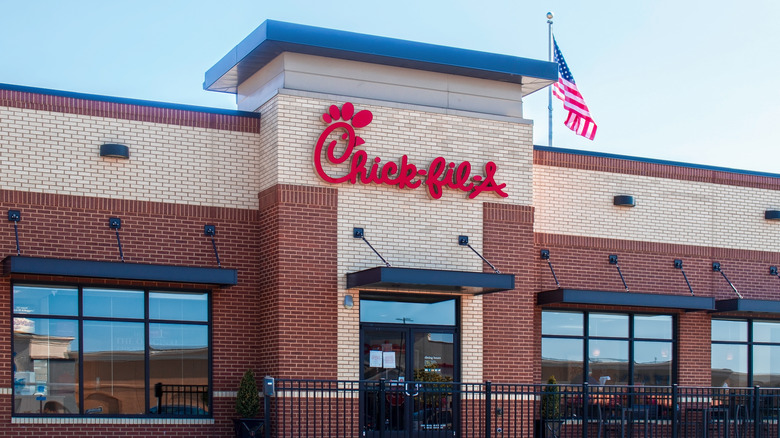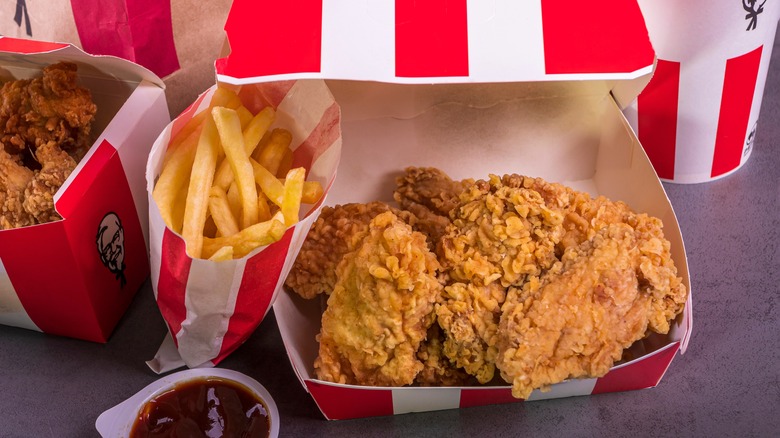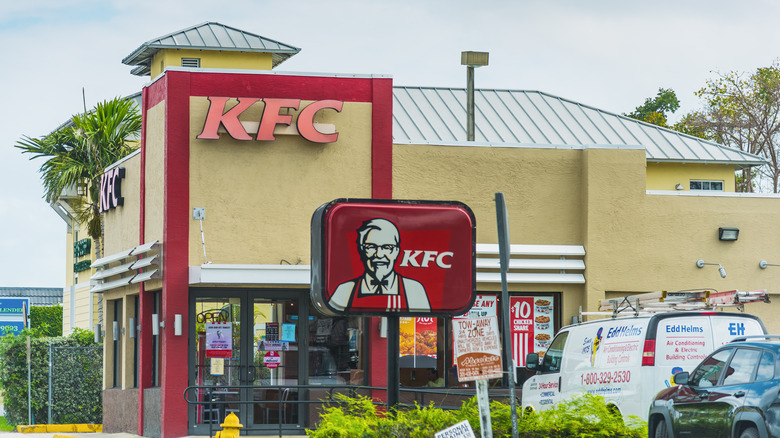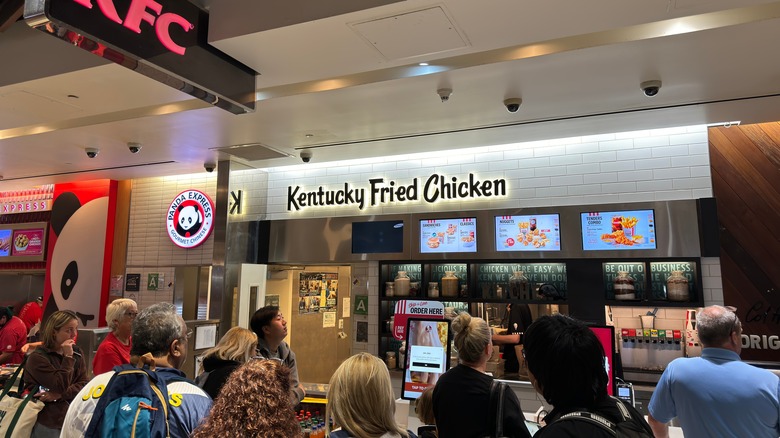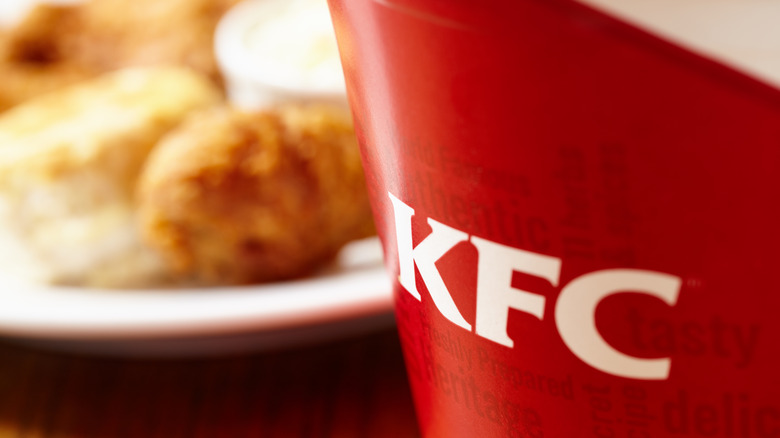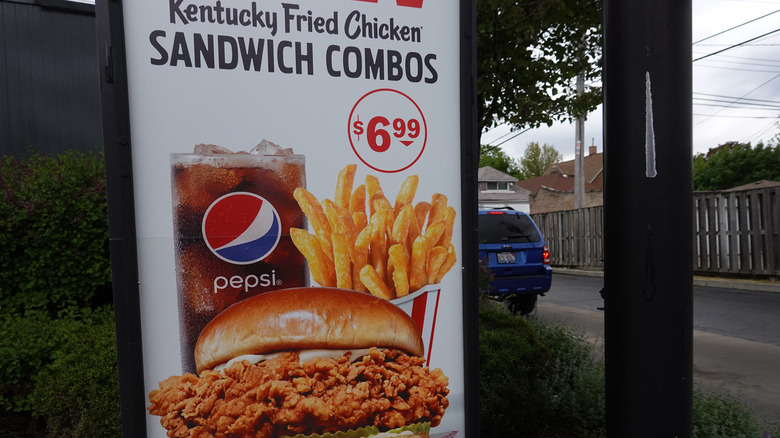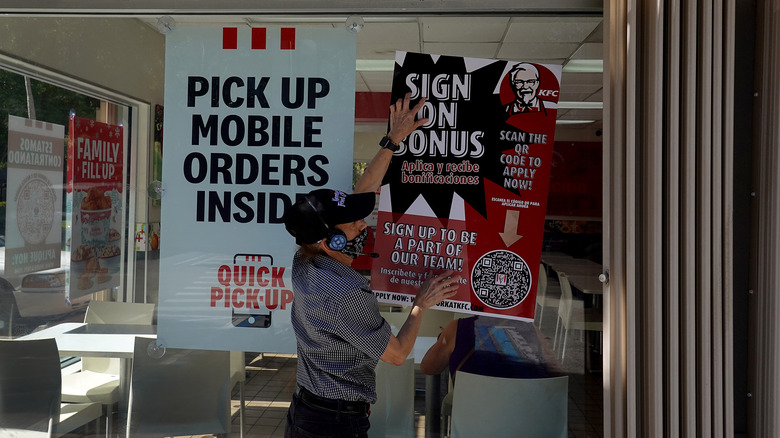Signs KFC Is Struggling To Stay In Business
It's been decades since Harland David Sanders (the man who would later be bestowed with the honorary title of "Colonel") started selling fried chicken from a roadside restaurant in Corbin, Kentucky. Unsurprisingly, the worldwide corporation known today as KFC has come a long way since these humble origins. Today, you can find the chain dotted around the U.S. and beyond, with over 29,000 restaurants selling the same KFC Original Recipe chicken.
But in recent years, it's safe to say that KFC's reign as the king of chicken is on shaky ground — if not already dead and buried. If you've eaten there yourself recently, you may have even remarked that the chicken doesn't quite hit the same as it used to. As per Colonel Sanders, the chain's quality began its downward slide the moment he sold it in 1964. He didn't exactly keep this sentiment to himself. In fact, KFC even sued the man whose likeness still represents the restaurant to this day, accusing him of libel and defamation after he made public remarks such as comparing its breading to "a damn fried dough ball stuck on some chicken" (via The Day).
Despite the Colonel's eloquent criticism, we'd argue that KFC's decline began in earnest in the 2010s. As other restaurants stepped up to serve customers' appetites — and to do it better, at that — the chain's shortcomings have earned it a smaller slice of the pie. Here's why we think KFC's days may be numbered.
KFC restaurants have started closing worldwide
When you look at the overall numbers, KFC's restaurants are going pretty strong. Its total number of outlets has increased year-on-year since at least 2010, with an increase of 2,140 restaurants in 2023 alone. However, the restaurant has still seen a number of restaurants shutter in recent years, which is rarely conducive to positive prospects.
In August 2024, franchisee EYM Chicken shuttered around 25 KFC restaurants across Illinois, Indiana, and Wisconsin, leaving almost 100 employees without a job in Wisconsin alone. This followed a similar spate of closures in Louisiana in October 2023, when employees reportedly received no notice that their respective store was shutting down until it happened, while California and New Jersey have both also experienced closures since the beginning of 2023. This trend isn't limited to the U.S. In June 2024, 13 KFC stores – all of which were owned by a singular franchisee — closed their doors for good across the U.K.
Sales are on the decline
Poor sales are the tipping point for any brand, especially if they go on for long enough. While KFC only recently started reporting a decline in sales, the situation is still significant enough to spark mild concern among the head honchos at Yum! Brands, KFC's parent company. In May 2024, its CEO, David Gibbs, noted that KFC's U.S. stores are "struggling" in an earnings call.
At the heart of this concern was the fact that KFC's U.S. sales dropped by 7% in the past quarter. Gibbs pegged some of this decline on "difficult weather conditions" across the U.S. — something other chains also used as an explanation for their own struggles — as well as the competition and promotions offered by rival fast food restaurants. KFC notably isn't facing the same issues everywhere. China, for example, continues to thrive. Sales surged by 8% in that same time period, with China home to twice as many KFC restaurants as the U.S.
For KFC to claw back the same kind of success on its home turf, Gibbs noted that it needs to try to replicate the tactics used elsewhere in its native country. "We know how to bring that brand to life to connect with consumers around the world," he said, "and we have to do a better job of that in the U.S." An admirable sentiment, but maybe too little, too late for the fried chicken chain.
The number of competitors has soared
The chicken scene is considerably bigger today than when Colonel Sanders started shilling meat at a roadside joint in 1930. KFC is just one drop in a pool of crispy, delicious chicken restaurants, many of which have earned stronger reputations with legitimate foodies. As RJ Hottovy, head of analytical research at Placer.ai, told Nation's Restaurant News, "Chicken is a highly competitive space, more than it has ever been ... It's a space I feel like people are looking for more variety and they're getting it elsewhere."
Most notably, Chick-fil-A has worked its way to the top of the poultry pyramid. Despite its disadvantage of closing every Sunday, it pipped KFC to the number one spot of the top U.S. chicken chains by sales in 2014. While KFC managed to hold on to second place for just under a decade, 2023 saw Popeyes snatch the silver medal. This came four years after the chain launched the fried chicken sandwich that sent its popularity soaring, and even sparked KFC to release its own in what's since been dubbed "the chicken sandwich wars" (via Restaurant Business).
That same year, KFC saw its market share drop from 16.1% to 11.3% (via CNBC). While it could pull off a miracle and regain some lost ground, the reality is that the competition only grows more fierce by the year, with the likes of Raising Cane's and Wingstop all proving worthy contenders to potentially step into third place in the coming years.
It's been accused of slashing the size of its menu items
Shrinkflation is a tragic reality of 21st-century dining. Nowadays, few chains can escape accusations of dwindling portion sizes that provide less value (and less satisfaction) for customers while still bearing the exact same price tag — or sometimes costing even more. Customers have snapped pictures of multiple "shrinking" KFC items in recent years, with the fries attracting particular ire for allegedly using narrower boxes and not filling them to the top.
The chicken hasn't escaped totally unscathed, either. Multiple customers have complained that each tender, wing, or thigh is considerably smaller than what they received in the past, with one alleged employee claiming that this stems back to the chain switching suppliers in 2016 and another alleging that each bird is now split up into 12 pieces instead of the former standard of nine. "Surely they're serving up mice at KFC now?" remarked one frustrated customer on Reddit upon receiving their chicken. Another user photographed their chicken tender next to a soda can to demonstrate its minuscule size; one set it side by side with a quarter, and one chose to compare their chicken thigh to a ketchup packet. Regardless of what everyday item is used as a makeshift measuring stick, customers have made their discontent pretty clear.
Its decision to use AI marketing was controversial
AI has proven divisive in pretty much every area — including chicken advertising, if one KFC campaign from April 2024 is anything to go by. The chain decided to pull the meta move of referencing one of artificial intelligence's most infamous visual pitfalls (by which we mean its inability to generate a standard five-fingered hand) in an Instagram advertisement that suggested the reason why it makes this mistake is because "the more fingers you have ... the more fingers you can lick."
The idea was that the campaign would promote KFC's newly launched saucy nuggets, with the restaurant encouraging people to jump on the bandwagon and generate their own AI hand image, posting it on social media and tagging KFC. Theoretically, it was lighthearted and funny. In reality, KFC faced an onslaught of anti-AI sentiment in the Instagram comments. "What a mediocre idea," wrote one Instagram user, while another remarked, "I didn't like the idea ... it's awkward and disgusting."
As is often the case with AI controversies, the overarching idea here was that using AI robbed a non-computer artist of a valid job opportunity, with one user commenting, "Imagine paying artists for their services." Whether it's due to outrage or just a general lack of interest, it was later noted that very few people actually participated in the campaign. All in all, not the most positive blot on the record of a company already struggling in the eyes of its target market.
KFC has been hit by multiple boycotts
Boycotts have played a significant role in the fast food industry in 2024. McDonald's, for example, was subject to boycott calls across the Middle East after a franchise belonging to Alonyal Limited announced that it would donate free meals to local hospitals and soldiers in Israel amid the ongoing conflict between Israel and Palestine. The chain has since seen a blow to its sales in the region, despite the McDonald's Corporation issuing a statement to TIME that it "is not funding or supporting any governments involved in this conflict."
Similar boycott calls have affected KFC. In fact, in Malaysia, these calls have proven so effective that KFC Malaysia temporarily closed over 100 restaurants in May 2024 due to what it described as "challenging economic conditions" (via Al Jazeera). While Boycott Divestment Sanctions Malaysia — which had issued a list of businesses to boycott over their alleged connections to Israel — clarified in June that it had never included KFC on said list, its chairman, Mohd Nazari Ismail, was quoted saying, "many Malaysians perceive any American fast-food operator to be related to Israel, including KFC" (per Arab News).
Two years earlier, KFC was hit by a separate scandal and further boycott calls — this time, in China. After the chain started giving away limited-edition toys with some meals (which subsequently sparked a mass ordering frenzy), The China Consumers Association called for customers to abandon the restaurant due to its encouragement of excessive consumption.
It was criticized for its racially tone deaf advertisement
KFC has a reputation for wild marketing stunts, once requesting that Pope Benedict XVI bless its new fish sandwich (which he declined) and launching a chicken sandwich into space. On rare occasions, it sticks to the straight and narrow, issuing traditional advertising campaigns that don't rely on religious figures or zero gravity for promotion.
But don't mistake that for drama-free. KFC has stumbled into some marketing faux pas in the past, with one ad campaign released by KFC Canada generating significant controversy in 2023. This saw customers ditching cutlery to eat chicken with their bare hands. However, the billboard version of this ad was called out for only featuring Black people eating fried chicken, which some saw as the brand utilizing racist stereotypes. "So yt people don't lick their fingers?" said one X, formerly known as Twitter user, before later adding, "I just know it's a Black person on the creative team like 'I knew this wasn't a good idea but they don't listen to me so I just clock in ... do my work ... n go home.'"
"While the commercial showcased real people sharing real moments, the billboards showcased only caricatures of Black ones," Tyra Jones-Hurst, managing partner at Oliver and founder and managing partner of InKroud, told Campaign Asia. She added that these billboards "dampened what should have been a cheeky and refreshing take on an old slogan into a classically harmful and stale stereotype for the Black community."
Some think the quality has gone downhill
KFC's "secret recipe" is legendary, made up of a blend of 11 herbs and spices that was (at least at one point) locked up in a high-security vault at KFC HQ. This blend may have allegedly been leaked in 2015 by Joe Ledington, a nephew of Colonel Sanders by marriage, but the restaurant still keeps the key to its tasty chicken close to its chest.
In recent years, however, customers have started to complain that this chicken isn't quite as tasty as they remembered. "I quit eating at KFC years ago because the quality kept going down — and down — and down," said one disappointed customer on Reddit. "Switched to Popeyes or Publix, both of which have chicken that is vastly better than anything I've had at KFC in 20 years."
This isn't a one-off complaint. Plenty of KFC regulars (or rather, former regulars) have chimed in online to share similar frustrations. "Always enjoy that first bite, then it's a steep decline for every bite that follows," said one Reddit user. As another noted, "It used to be okay growing up, but they have since used cheaper ingredients to produce lesser quality food. I haven't eaten there in over 8 years, and I never hear anyone saying how great it is." Whatever the reason for this decline, it's safe to say that the tide has most definitely turned on KFC for many fast food fans — hence why they're looking elsewhere.
Customers think it's way too expensive nowadays
The only thing worse than declining quality is food that not only tastes worse but costs more. A horde of KFC customers have flocked to Reddit to criticize the prices for KFC in recent years. "KFC in my area is so good but got expensive all of the sudden?" wrote one Reddit user. "$30 dollars for 8 piece chicken family meal?" Judging by how many others have chimed in with their own similar sentiments, this is one of the reasons why customers have started pulling away from KFC. As one user put it, "I see KFC going under. Way [too] expensive. One of two in my area just closed and is being replaced with a [Chick-fil-A]. Other one is always empty."
As per some employees, the reason why these prices have soared is because the profit margins have narrowed for the chain. Chicken has notoriously grown more expensive since the COVID-19 pandemic, with prices soaring at grocery stores nationwide – although, as some noted, KFC still stands out as one of the more expensive chicken fast-food restaurants. In general, fast food chains in general have felt pushback from customers about increasing prices amid the rising cost of living. McDonald's, Papa Johns, Starbucks, Pizza Hut, and more all reported sales drops in the same quarter. KFC certainly isn't alone in struggling in this regard. However, increasing the overall price doesn't exactly help its case among customers.
Customers aren't impressed by the service (and employees aren't impressed by the pay)
Customers have complained en masse about the disappointing service doled out at KFC. While nobody enters a fast food joint expecting Michelin-level attention, some have claimed that they didn't even receive the bare minimum. "Literally every time I've been, to at least 6 different locations, the service has been slow, and the kitchen staff always seem to be behind, confused, and messing up orders," noted one Reddit user.
If you pore over similar complaints online, they all seem to touch on these same points — especially KFC's track record of providing inaccurate orders. At the same time, a counterargument posed by sympathetic customers and KFC employees, past and present, focuses on the fact that KFC allegedly underpays its workers. "The bad service could be due to overworked, underpaid staff," said one alleged former worker. 'We are very busy and constantly asked to do overtime, up to the point that everyone is exhausted even when we're not busy."
In 2021, a TikTok went viral when it called out a Las Vegas location for offering just $11 per hour for a supervisor job. Employees have previously walked out of some restaurants in the fight for fair wages, while others sued a major KFC franchisee, KBP Foods, in 2018 for not even paying the minimum wages they were owed. These kinds of disputes are commonplace at businesses of this scale, but they certainly don't help KFC's reputation in the big picture.
